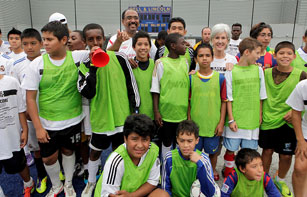
UNAIDS Executive Director Michel Sidibé and US Secretary of Health and Human Services Kathleen Sebelius participated in the YouthScore 2012 event in Washington, on 21 July, 2012. Credit: UNAIDS/Y.Gripas
On the eve of the first International AIDS Conference in the United States in two decades, Michel Sidibé, Executive Director of the Joint United Nations Programme on HIV/AIDS (UNAIDS), joined US Secretary of Health and Human Services Kathleen Sebelius and others to launch Youth Score—a series of events to mobilize young people to lead the way to an AIDS-free generation.
The events will use sports, music and art to connect young people to the information they need to protect themselves and others from HIV. According to a UNAIDS report released on 18 July, youth remain particularly vulnerable to HIV infection. Nearly 5 million people aged 15-24 were living with AIDS in 2011 and, that same year, almost 900,000 young people became newly infected with HIV. The report shows that young people overall lack key information on HIV prevention and transmission. It calls for broad social mobilization of young people to reach the vision of “three zeros.”
“Young people are among the most vulnerable to new HIV infections, but their calls for support are too often not heard," said Michel Sidibé. “This must change as this is the generation that will help bring us to our vision of zero new HIV infections, zero discrimination and zero AIDS-related deaths.”
The Youth Score launch event brought together young people from Washington DC and across the world to share their experiences in stopping AIDS. It attracted more than 200 young people who came out to participate in workshops and clinics with Lorrie Fair of the U.S. Women’s National Soccer Team, Steve Zakuani of the Major League Soccer team Seattle Sounders and former National Basketball Association player Michael Adams. Entertainment was provided by graffiti artists and musicians, including DJ Money and Niqé.
Much of the focus of the event was on equality and human rights, and the broader initiative will push these themes in an effort to reverse AIDS-related stigma. According to the new UNAIDS report, minority youth and gay men are particularly at risk of infection:
- There are nearly 5 million young people living with HIV in the world. About 2400 young people become infected with HIV each day.
- Awareness about HIV is low among young people—only 24% of young women and 36% of young men have adequeate basic information about HIV.
- Young women 15-24 old are most vulnerable to HIV infection, with infection rates twice as high as among men of the same age.
“The International AIDS Conference is a big deal because HIV in DC is a big deal,” said Leonard, 16 years, a participant in the event from Northwest DC. “Hopefully since people from all over the world will be involved, people will recognize how bad it is in DC and the rest of the world and pay attention to our epidemic.”
Young people are among the most vulnerable to new HIV infections, but their calls for support are too often not heard. This must change as this is the generation that will help bring us to our vision of zero new HIV infections, zero discrimination and zero AIDS-related deaths
UNAIDS Executive Director Michel Sidibé
NBA legend Magic Johnson, who has lived with the disease since the early 1990s, echoed the sentiment. “In the fight against AIDS in America, young people from minority communities need to be on the front lines, “he said. “YouthScore and other programs that are raising awareness in economically challenged areas are vital.”
In addition to highlighting equality, Youth Score focuses on expanding access to HIV education, male and female condoms and resources for youth organizations that focus on the disease. As evidenced by the participation of Secretary Sebelius, the initiative will also seek out partnerships and collaboration with diverse sectors to ensure that young people’s voices are heard in discussions over policy and programs.
“The Obama Administration’s goal of an AIDS-free generation will only be reached if young people play a central role,” said Kathleen Sebelius. “That’s why UNAIDS’ efforts to give them a voice and the tools they need to be effective leaders in their communities is so important.”
Youth Score will eventually visit a range of countries around the world before culminating in Salvador de Bahia at the opening of World Cup 2014 in Brazil.
"No sport is more popular with global youth than soccer," said world-famous Brazilian soccer star Ronaldinho. "Whether in Washington, Rio, or Johannesburg, soccer has the ability to act as an attractive platform to bring together young people and educate them about AIDS.”
Partners in the Washington DC event included the DC Department of Health, The Grassroot Project, Metro TeenAIDS, Soccer for Good, The Magic Johnson Foundation, Advocates for Youth, The World Bank, Ragball International, Youth Force, Monumental Sports and Youth Core.




